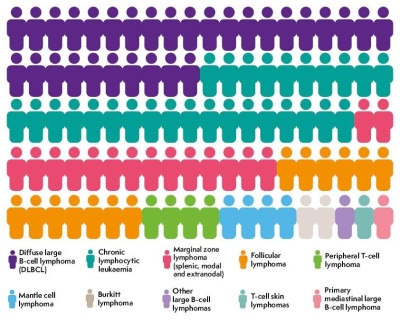Overall, lymphoma is the fifth most common cancer in the UK.
As there are so many types of lymphoma, some types are rare. This graphic from Lymphoma Action shows how common various types of lymphoma are.

Image used courtesy of Lymphoma Action;
taken from web page correct as of April 2022
About low-grade non-Hodgkin lymphoma
Lymphoma cancer cells can grow at very different rates. Some types of non-Hodgkin lymphoma are called ‘low grade’ when the lymphoma cells are dividing slowly. They are also sometimes referred to as indolent lymphoma.
There are many different types of low-grade non-Hodgkin lymphoma.
Some of the more common low-grade B-cell lymphomas include:
- Follicular Non-Hodgkin Lymphoma (F-NHL) – this is the most common type
- Nodal marginal zone B-cell lymphoma
- Extranodal marginal zone B-cell lymphoma (also called MALT lymphoma)
- Splenic marginal zone lymphoma
- Small lymphocytic lymphoma
- Lymphoplasmacytic lymphoma (also called Waldentröm’s macroglobulinaemia)
Low-grade lymphomas often respond well to treatment, and many patients achieve ‘complete remission’ – which means no evidence of lymphoma on scans or other tests.
Although they have a tendency to come back (relapse), they can usually be treated again.
Treatment at The Clatterbridge Cancer Centre
It might sound strange but low-grade lymphoma does not always need treatment. Quite often, it is found ‘incidentally’ – this means it was found during tests for something else.
As these lymphomas grow very slowly, they might need little or no treatment for months or possibly years.
This is especially the case if they are not causing any symptoms. In such cases, your clinical team will just monitor your lymphoma – often referred to as ‘watch and wait’. Research has shown that there is no benefit from starting treatment early.
If you develop symptoms relating to the lymphoma – or we are concerned – we will usually discuss treatment options with you at that stage.
Treatment depends on a range of factors including the type, size, stage and location of your tumour. It may also depend on your age, general health and genetic factors (linked to the DNA changes in your cells) that tell us how your cancer developed.
When you are diagnosed, your care will be discussed at a multidisciplinary team meeting (MDT) where different specialists will consider the best treatment options for you. Your doctor will discuss this with you so you can decide what is right for you.
When appropriate, we provide a range of specialist treatments for low-grade lymphomas. These include:
- Chemotherapy
- Radiotherapy
- Targeted treatments including antibody therapy (immunotherapy)
- Steroids
- Stem cell transplants
- Clinical trials
- Supportive treatments (such as blood transfusions)
- Treatment to control symptoms (palliative care)
Find out more about chemotherapy and other cancer drug therapies at The Clatterbridge Cancer Centre.
Find out more about radiotherapy at The Clatterbridge Cancer Centre.
Find out more about clinical trials at The Clatterbridge Cancer Centre.
Further information
Our Cancer Information and Support Centres can provide individualised help and support for patients and families affected by cancer. The team’s main base is in Clatterbridge Cancer Centre – Liverpool but they also work at our Aintree and Wirral hospitals.
There are also local Macmillan services in other hospitals across our region.
External sites that offer extra support and information about different types of high grade lymphoma include: